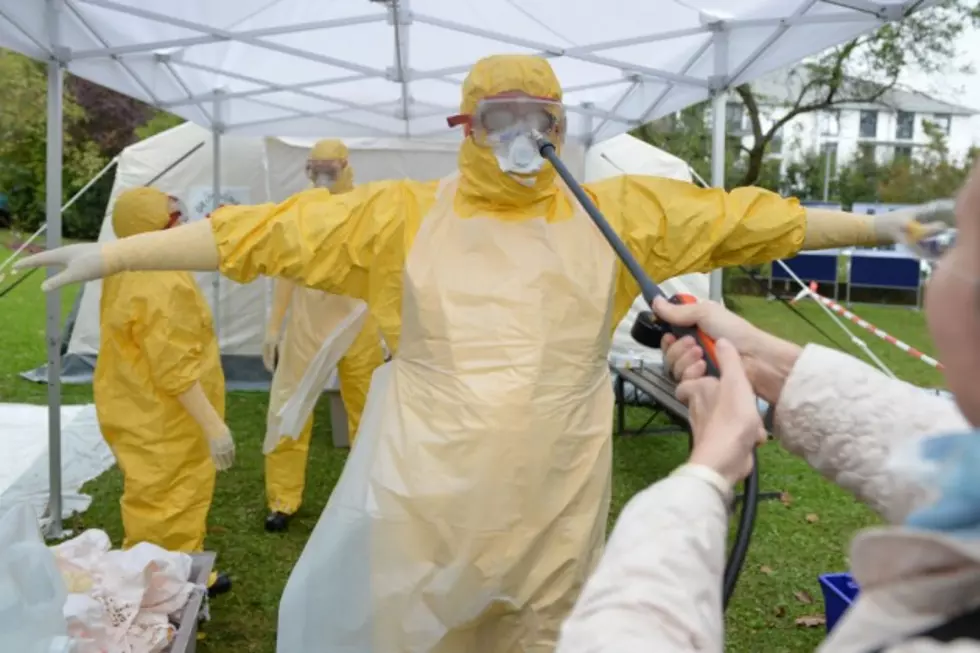
5 Things You Should Know About Ebola — How It Spreads, Symptoms & More
With the recent report of a health worker in Dallas testing positive for exposure to Ebola, it seems like news of the virus isn’t going to die down any time soon. But just because the deadly disease is all over the headlines these days, that doesn't mean it's time to panic.
The fact remains that the people who are most at risk for contracting the virus are—and this is without question—those who are caring for or otherwise coming into contact with sick patients. Basically, if you aren't around someone who already has Ebola (and you aren't), you won't contract it.
Even so, to keep yourself safe and to prevent undue panic, here are some helpful things to know about Ebola:
Symptoms
While they can be flu-like, the symptoms of the Ebola virus are pretty clear and specific. They include a fever above 101.5 degrees, severe headache, muscle pain, weakness, vomiting, diarrhea, abdominal pain and unexplained bleeding or bruising. Generally, symptoms appear eight to 10 days following exposure to the virus, although they can appear anywhere from two to 21 days later.
How It’s Spread
Knowing how Ebola is spread is the key to preventing it from continuing to spread. First of all, a person who has contracted the virus is only contagious after symptoms begin, meaning once he has a fever. The virus is transmitted through direct contact with bodily fluids. This means broken skin or mucous membranes in the eyes, nose or mouth must come in contact with the blood, urine, saliva, sweat, feces, vomit, breast milk or semen of a person who is already Ebola-symptomatic.
Direct fluid contact with contaminated needles and syringes can also pass the virus. Ebola is not spread through the air or by water, nor is it spread by food, although handling infected animals while hunting or preparing them for eating can pass the virus. The virus is not spread through insects.
Who Is At Risk
Since Ebola is only spread through close contact and patients are only contagious once they start showing symptoms, the people who are most at risk for contracting the virus are health workers caring for Ebola patients, especially in poorly managed facilities, and family and friends who are in close contact with patients. These people are the most likely to come into contact with the blood or bodily fluids of a sick patient.
People still at risk, but to a lesser degree, are:
- those who don’t carefully transport the bodies of deceased patients,
- those who don’t fully protect themselves when handling bedding, clothing or syringes used by an infected patient, or
- those who come in contact with infected wildlife.
So if you don't fall into any of those groups, it's almost impossible to become infected.
Treatment
As of now there is no known or marketed cure for the Ebola virus. There are experimental drugs currently being tested, but there isn’t enough evidence to show that they work. Experts say the best way to treat infected patients is by treating the symptoms early to help them fight the virus and return to health. This means an infected patient will receive intravenous fluids, salts and minerals to replace what is lost due to the illness.
If the virus has weakened the patient's immune system and led to a bacterial infection, he will receive antibiotics. Currently, three different biochemical companies are working on vaccines, but there is no indication as to when these will be tested or available. The good news is that if a patient successfully fights Ebola and builds up the antibodies against it, he is immune for at least 10 years.
What You Should Do
The best way to protect yourself from contracting the Ebola virus, if you're not in one of the most at-risk groups listed above, is to wash your hands and use hand sanitizer, especially while traveling. If someone you know has recently been in a place where he could have become infected, get him to a hospital immediately if he starts to show signs of a fever or any symptoms—and avoid contact with him. Do not carelessly touch his clothing, towels or bed linens.
Finally, if you think you may have come in contact with Ebola, either by direct contact with the bodily fluids of an infected patient or by contact with an infected animal, stay away from other people and seek medical attention right away.

